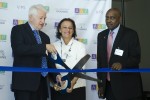A purple ribbon hung from the walls of an airy, light-filled room at Campbell Hall. With a snip of the scissors, a representative of UCLA’s Academic Advancement Program cut the ribbon and unveiled the Hall’s brand-new learning pavilion Tuesday.
The Academic Advancement Program will use the 2,030-square-foot learning pavilion to further expand facilities for its Peer Learning program, said AAP Director Charles Alexander. The program, established in 1971 to support UCLA’s diverse student community, provides academic resources such as career counseling, tutoring, need-based scholarships and research opportunities to students who are AAP members.
The extension cost about $3 million to build and was funded in part by a donor’s fund and a loan from the UCLA College of Letters and Sciences.
Marvin Zepeda, a senior programming director at FOX Sports and an alumni speaker at the event, recalled the support he received from AAP counselors and staff during his undergraduate years.
“I took part in the freshman summer program, study sessions and counseling,” Zepeda said. “(AAP) gave me the tools and resources that helped me keep sight of my goals.”
The program currently serves about 5,600 students. About 84 percent of AAP students come from historically underrepresented backgrounds, including Hispanic or Latino, African American and Native American, according to the program’s website.
The Peer Learning program is one of AAP’s most popular services, Alexander said. About 100 UCLA students work as Peer Learning facilitators, who lead small groups of students in supplementary classes each week. Students can sign up for sessions through MyUCLA in the first three weeks of each quarter. About 2,000 students participate in the program’s Peer Learning workshops each week, according to the organization’s website.
Fifth-year philosophy student Edgar Rodriguez took advantage of AAP’s Freshman/Transfer Summer Program upon his transfer to UCLA. In 2013, he joined AAP staff as a Peer Learning facilitator.
“I’ve been waiting for this to open since last year,” Rodriguez said. “For (UCLA) to have a building like this allows underrepresented communities like Latinos and African Americans to have proper resources at UCLA.”
Alexander said Campbell Hall is important to the history of ethnic studies movements on campus. Student activists such as Alprentice “Bunchy” Carter and John Huggins helped launch UCLA’s African American studies program, which then encouraged the rise of subsequent ethnic studies programs on campus such as Asian American studies, Chicana/o studies and gender studies, Alexander said.
Alexander said he wants Campbell Hall to be a safe space for students. Recently, incidents of discrimination have occurred at UCLA, such as the discovery of insensitive stickers on campus targeting the black community and undocumented individuals.
“This is the students’ academic home,” he said. “(I want them to) know it’s a safe place where they feel protected and are able to talk about things that concern them.”
Next year, Alexander said he wants to expand the program’s academic support staff to adjust for a growing student body. Some of AAP’s goals include hiring more professional and student staff and expanding its Peer Learning courses, he added.
“To see people realize their dreams is the most rewarding part of my career,” he said. “They come in as undergraduates, and they transform themselves.”
